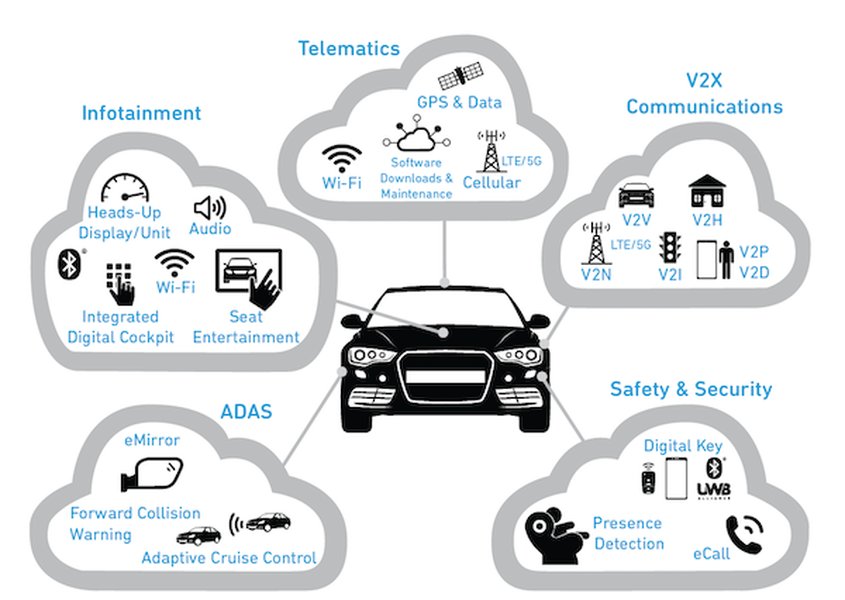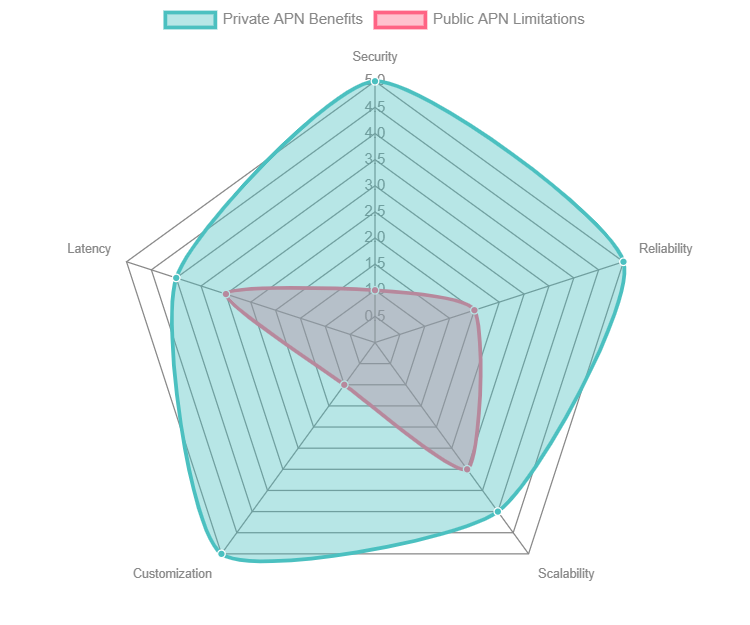In the rapidly evolving world of connected vehicles, Automotive APN IoT solutions are transforming the landscape for vehicle Original Equipment Manufacturers (OEMs). These solutions enable seamless connectivity, robust security, and new opportunities for innovation and revenue. As vehicles become increasingly “smart” and software-defined, the need for reliable, scalable, and secure data transmission has never been greater. This article explores how Automotive APNs and dedicated IoT connectivity empower OEMs to deliver next-generation mobility experiences.

Figure: The expanding realm of connected cars, highlighting the integration of various technologies.
The Pivotal Role of Automotive APNs in Connected Vehicles
An Access Point Name (APN) serves as a crucial gateway in cellular networks, directing data from mobile devices, including in-vehicle IoT devices, to the correct network or cloud services. For connected cars, data is typically segmented into different categories, such as telematics data and infotainment data. By using dedicated Automotive APN IoT channels, OEMs can ensure that sensitive telematics data is isolated from infotainment traffic, enhancing both security and network performance.
Understanding Public vs. Private Automotive APNs: A Critical Choice for OEMs
The choice between public and private APNs significantly impacts the security and control OEMs have over their connected vehicle data. Understanding these distinctions is crucial for designing robust automotive IoT solutions:
Public APNs:
Public Access Point Names (APNs) are the default option for many SIM-based subscriptions. They assign dynamic IP addresses and route traffic over the public internet, managed by the Mobile Network Operator (MNO). While convenient for general-purpose internet access, public APNs expose connected devices to potential cyber threats due to their open nature. This makes them less suitable for use cases involving sensitive data, such as in connected vehicles or critical IoT applications.
Private APNs:
Private APNs are specifically configured to provide secure and controlled connectivity for IoT and enterprise applications. They typically assign static IP addresses and route data traffic directly to a corporate network through a secure tunnel, bypassing the public internet. This network segmentation reduces exposure to external threats and supports enhanced security measures such as:
- Custom firewall configurations
- End-to-end encryption
- Secure IP whitelisting
In automotive applications, private APNs play a critical role by ensuring secure telemetry, diagnostics, and over-the-air updates. They are also widely adopted in sectors like healthcare, government, and legal services, where data confidentiality and integrity are paramount.

This radar chart illustrates the comparative advantages of Private APNs versus the limitations of Public APNs across key metrics vital for automotive OEMs. Private APNs consistently score higher in aspects like security, reliability, customization, and minimizing latency, showcasing their superior suitability for sensitive vehicle data transmission and mission-critical applications. In contrast, Public APNs, while offering basic connectivity, fall short in these crucial areas, reinforcing the need for dedicated solutions in the connected automotive ecosystem.
The Benefits of Automotive APNs and Dedicated IoT Connectivity for OEMs
Dedicated IoT connectivity, primarily facilitated by private APNs, offers numerous advantages for automotive OEMs, empowering them to navigate the complexities of modern vehicle ecosystems:
1. Enhanced Cybersecurity and Compliance
Private APNs are a cornerstone of IoT security. By routing sensitive vehicle data directly into a private corporate network, OEMs can significantly reduce the risk of malware or malicious attacks. This is especially vital as vehicles must now comply with UNECE regulations R155 and R156, which mandate robust cybersecurity and software update management systems. OEMs can customize connectivity to ensure sensitive data is relayed only on a private network, using private APNs to segment customers, traffic, and use cases securely. Blocking M2M connectivity by default further reduces risk.
2. Reliable Data Transmission and Real-time Insights
With a dedicated connection, OEMs can ensure consistent and reliable data flow from their vehicles. This is crucial for real-time monitoring of vehicle health, enabling predictive maintenance, and facilitating seamless over-the-air (OTA) updates for firmware and bug fixes. The ability to collect valuable data on asset history, utilization, trends, location, hours of operation, and diagnostic codes helps OEMs make informed decisions about design, component selection, and warranty coverage.
3. Customization and Control
Private APNs empower OEMs with greater control over their network. They can implement customized firewall rules and IP addresses, moving beyond default settings to customize connectivity to specific use cases. For instance, telemetry data can be sent to a dedicated APN representing the OEM’s connected vehicle cloud, while infotainment data uses another, ensuring optimal performance and security for each stream.
4. Scalability and Global Deployment
OEMs integrating IoT solutions can benefit from platforms that scale effortlessly from thousands to millions of devices. Connectivity service providers ensure seamless connection from the factory floor to end products worldwide, enabling OEMs to streamline global operations and deploy connected devices in over 200 countries with zero-touch provisioning. This global reach is essential for modern automotive manufacturing and distribution.
5. New Revenue Streams and Improved Customer Experience
Integrated connectivity allows OEMs to differentiate their products, improve customer satisfaction, and explore new business models. Remote control and automation platforms enable command over devices from anywhere, enhancing convenience and security. The ability to provide an “always up-to-date” Android Automotive experience, supported by APIs for developers, enhances user experience and opens up future business opportunities through subscription services and value-added features.
Public vs. Private Automotive APNs
| Feature | Public APN | Private (Dedicated) APN |
|---|---|---|
| Accessibility | Open internet gateway | Restricted to a specific network (OEM backend/VPN) |
| Security | Standard operator firewalls and internet security | Enhanced: data stays on private core network (often with VPN/IPsec) |
| IP Addressing | Dynamic/public IP | Fixed or reserved IP (accessible only within the corporate domain) |
| Control & Monitoring | Minimal (carrier-managed) | Full control by OEM/MNO; easier fault isolation |
| Use Case (Vehicles) | General internet access (e.g., public Wi-Fi hotspot) | Critical services (telemetry, eCall, OTA, backend services) |
| Roaming & Mobility | Works globally with roaming, but same as any user | Multi-IMSI solutions handle global roaming on one SIM |
| Examples | Internet or operator APN | OEM backend APN for telematics; VPN to OEM network |
FAQs
What is an Automotive APN?
An Automotive APN (Access Point Name) is a gateway setting that defines how an IoT device within a vehicle connects to a mobile network and routes its data traffic. It specifies the path for telematics, infotainment, and other in-vehicle data to reach specific cloud services or private networks.
Why are Private APNs crucial for automotive OEMs?
Private APNs are crucial for OEMs because they provide enhanced security by routing sensitive vehicle data directly into a private corporate network, isolated from the public internet. This significantly reduces the risk of cyber threats, ensures data privacy, and helps OEMs comply with stringent cybersecurity regulations like UNECE R155 and R156.
How do Automotive APNs support Over-the-Air (OTA) updates?
Automotive APNs, especially dedicated private ones, ensure a stable and reliable connection for OTA updates. This uninterrupted data delivery is essential for securely pushing software patches, firmware updates, and new features to vehicles, crucial for maintaining safety, performance, and introducing new functionalities without requiring a service visit.
What are the benefits of dedicated IoT connectivity for OEMs beyond security?
Beyond security, dedicated IoT connectivity offers OEMs reliable data transmission for real-time monitoring and predictive maintenance, greater customization and control over their network, global scalability for seamless vehicle deployment worldwide, and the ability to unlock new revenue streams through advanced connected services and improved customer experiences.
Conclusion
Automotive APN IoT solutions and dedicated IoT connectivity are foundational elements for OEMs striving to thrive in the complex connected vehicle ecosystem. They provide the secure, reliable, and scalable backbone required for advanced telematics, seamless OTA updates, robust V2X communication, and intelligent vehicle-to-cloud communication. By leveraging these technologies, OEMs can significantly enhance cybersecurity, gain invaluable operational insights, and deliver superior customer experiences. Partnering with experienced connectivity providers like Horizon Connect positions OEMs to harness these transformative technologies for sustained competitive advantage and to truly drive the future of smart mobility.


